Sudan
Paramilitary forces and their allied militias fighting for power in Sudan have carried out large-scale ethnic killings and rapes as they take control of much of West Darfur, which could amount to war crimes and crimes against humanity, UN experts said in a new report.
The report to the United Nations Security Council, obtained Thursday by The Associated Press, paints a terrifying picture of the brutality of the Arab-dominated Rapid Support Forces (RSF) against Africans in Darfur. It also explains how Rapid Support Forces managed to take control of four of Darfur's five states, in part through complex financial networks involving dozens of companies.
Sudan plunged into chaos in April, when long-simmering tensions between the army, led by General Abdel Fattah Burhan, and the Rapid Support paramilitary forces, commanded by Mohammed Hamdan Dagalo, boiled over into street fighting in the capital, Khartoum.
The fighting has spread to other parts of the country, but in Sudan's Darfur region, it has taken a different form: brutal attacks by Rapid Support Forces against African civilians, particularly members of the Masalit ethnic group.
War crimes
Two decades ago, Darfur became synonymous with genocide and war crimes, particularly by Arab Janjawid militias against populations who identify with Central or East Africa. This appears to be the case again, with International Criminal Court prosecutor Karim Khan saying in late January that there was reason to believe both sides were committing war crimes, crimes against humanity. or genocides in Darfur.
The panel said Darfur was experiencing "its worst violence since 2005". The ongoing conflict has caused a large-scale humanitarian crisis and displaced around 6.8 million people - 5.4 million in Sudan and 1.4 million who have fled to other countries, including around 555,000 to neighboring Chad, said the experts.
Both the RSF and rival Sudanese government forces have used heavy artillery and shelling in highly populated areas, leading to the mass destruction of critical water, sanitation, and sanitation facilities. , education, and health care.
In their 47-page report, the experts indicate that the RSF and its militias targeted sites in Darfur where displaced people had found refuge, civilian neighborhoods, and medical facilities.
According to intelligence sources, the panel said that in one town alone – Geneina, the capital of West Darfur state near the Chad border – between 10,000 and 15,000 people were killed.
Sexual violence
Experts said sexual violence by the RSF and its allied militias was widespread.
According to Geneina's reliable sources, women and girls as young as 14 years old were raped by RSF elements in a United Nations World Food Program warehouse controlled by the paramilitary force, in their homes or when they returned home to collect their personal belongings after being displaced by violence. In addition, 16 girls were reportedly kidnapped by RSF soldiers and raped.
“Racial slurs against the Masalit and the non-Arab community were part of the attacks,” the panel said. “Neighborhoods and homes were continually attacked, looted, burned and destroyed, particularly those where Masalit and other African communities lived, and their residents were harassed, assaulted, sexually abused and sometimes executed.”
Experts said prominent members of the Masalit community were targeted by the FSR, which had a list, and the group's leaders were harassed and some executed. At least two lawyers, three doctors, and seven staff members, as well as human rights activists who were monitoring and reporting on the events, were also killed.
The RSF and its allied militias looted and destroyed all hospitals and medical storage facilities, leading to the collapse of health services and the deaths of 37 women suffering from childbirth complications and 200 patients requiring treatment. kidney dialysis, according to the expert panel.
Torture
According to the report, after the assassination of the West Darfur governor in June, the Masalit and African communities decided to seek protection in Ardamata, just outside Geneina. A convoy of thousands left at midnight, but as it reached a bridge, FSR and allied militias opened fire indiscriminately, and survivors reported that around 1,000 people had been killed.
The panel stressed that disproportionate and indiscriminate attacks against civilians – including torture, rape and murder, as well as the destruction of essential civilian infrastructure – constitute war crimes under the Geneva Conventions of 1949.
The RSF was created from Janjawid fighters by Sudan's former president, Omar al-Bashir, who ruled the country for three decades, was overthrown in a popular uprising in 2019, and is wanted by the Criminal Court internationally for accusations of genocide and other crimes during the conflict in Darfur in the 2000s.
According to the group of experts, "the RSF's takeover of Darfur relied on three lines of support: allied Arab communities, dynamic and complex financial networks, and new military supply lines through Chad, Libya, and South Sudan."
While the Sudanese army and the RSF have engaged in extensive recruitment drives across Darfur starting in late 2022, the RSF have been more successful, experts say. They also "invested large sums from their pre-war gold trade in several sectors of activity, thus creating a network of 50 companies".
Financial networks
The RSF's complex financial networks "made it possible to acquire weapons, pay salaries, finance media campaigns, lobby and buy support from other political and armed groups", the experts said.
U.S. Ambassador to the U.N. Linda Thomas-Greenfield, who visited Chad in September, called the report's findings " horrible" and said she was "deeply disappointed" that the Council UN Security Council and the international community have paid so little attention to these allegations. “The Sudanese people feel like they have been forgotten,” she said.
Given the humanitarian catastrophe in Sudan and the wider region, Thomas-Greenfield called on the Sudanese army to lift the ban on cross-border aid from Chad and to facilitate cross-border aid in coming from the east of the country. She also demanded, in a statement on Wednesday, that the RSF end the looting of humanitarian warehouses and that both sides stop harassing aid workers.
“The Council must act urgently to alleviate human suffering, hold those responsible to account, and end the conflict in Sudan,” the US ambassador said. "Hurry up."



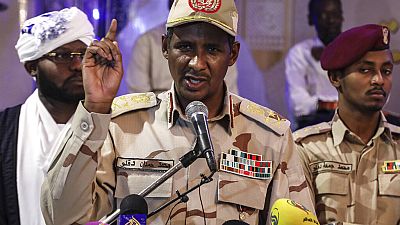

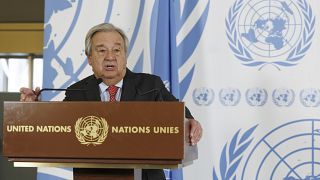
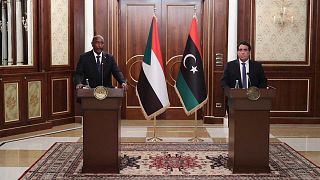
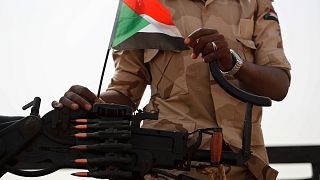
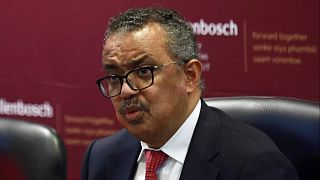
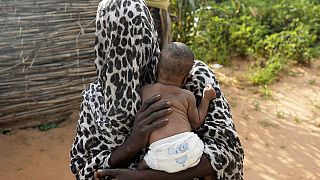


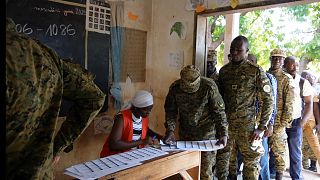
01:09
Liberian president issues official apology to civil war victims
01:25
MSF: Access to healthcare in Sudan 'almost impossible' as attacks on healthcare facilities increase
01:09
Sudan: RSF paramilitaries and allies declare parallel government
01:11
Sudan: U.S. sanctions over alleged chemical weapons use come into force
01:39
Driven to starvation, Sudanese eat weeds and plants to survive
00:58
Cash crunch stalls UN probe into possible war crimes in DR Congo